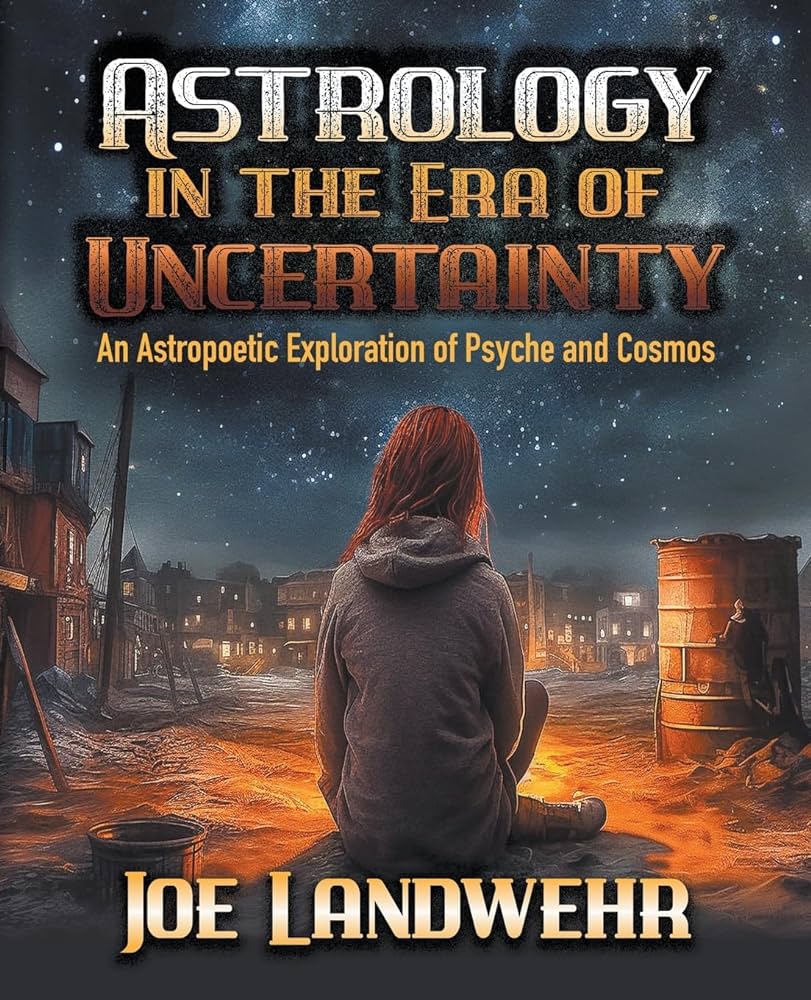I waded through much of author Joe Landwehr’s new book because he’s been studying astrology for about fifty years, he has written previous books, and because I respect the reputations of a couple of the people who wrote blurbs for this one. This book has some useful information and interesting observations about the history of astrology as a subject of study and practice. But the book is long, sweeping, and unwieldy, and it’s not that easy to figure out what exactly the author’s point is. When I pick up a book of 445 pages, I want to know: What’s it about? Is it about the philosophies underlying and/or opposing astrology? Is it about how to work with charts? Is it a critique of modern science’s critique of astrology? Is it a memoir?
The book has an intriguing title. We’re definitely in an age of uncertainty now, and has that not always been true? The subtitle, for readers who know astrology, seems to be a play on the phrase “Cosmos and Psyche,” the title of Richard Tarnas’ foundational and now-classic work of mundane (worldly) astrology.
He begins with a critique of astrology’s scientific track record and what he calls “the astrological community’s ambivalent embrace of science.” This is a subject that deserves its own treatment, and it has--most recently and most thoroughly in Bruce Scofield’s 2023 book The Nature of Astrology (reviewed in March 2023 on facingnorth.net.) The saga of whether astrology is scientific does not begin with the 1950s statistical “Gauquelin studies,” which is where Landwehr begins. For millennia, astrologers and astronomers were the same people, which is why astrologers used to be called “mathematicians.” Currently, there’s work being done to test astrology’s propositions in at least somewhat scientific ways (see for example the work of David Cochrane.) I did not find such work mentioned in Landwehr’s book.
Regardless, Landwehr’s central point, which he seems to begin to make about mid-way through this book, is that his own approach to astrology is what he calls astropoetics. ”It is “the recognition that the ‘facts’ of astrological interpretation are actually better understood as poetic similes and metaphors that resonate in various ways with a multi-layered truth that means different things at different times.” It is a valid point. And, I can think of no astrologer, in either the traditional or modern psychological schools of practice, who doesn’t consider astrological symbols to be multivalent. For any placement of a planet in a house, sign, and by aspect, there are many possible meanings. But there are meanings, and there are boundaries between one thing and another.
Landwehr asserts that “Traditional astrology – and most contemporary astrology as well – aims at an ‘objective’ understanding of the symbolism – what this means, not just for you or I, but in general, as a statement of astrological truth. As it is routinely practiced today, astrology has become largely a matter of rationally decoding signs that have become short-hand notation for known qualities.”
It’s true. Astrolog(ies) – there’s not just one astrology – are systems or languages that help humans interpret correlations between alignments in the sky and the qualities, events, and processes experienced by individuals and collectives on Earth. Someone, for example, with natal Mercury in Virgo is not the same kind of thinker and communicator as someone with Mercury in Scorpio.
What might be an alternative? Landwehr proposes that “astropoetics seeks instead to discover unknown sensory, emotional, psychological, imaginal, mythological and spiritual correlates to symbols, and the images that embody these correlates, along a path that is unique to the individual….”
With all due respect, that’s not exactly how astrology has evolved and why it’s useful, and here’s why: Astrology is like poetry in that it can be beautifully inspirational and in that it is more of an interpretive art than a hard science. But if anything can mean anything – i.e. “unique to the individual” – then anything can mean everything, or nothing at all. Just look at some of the poorly informed internet astrology to see the pitfalls of disconnecting from well-trodden systems of meaning. Such astrology turns to mush.
I could go on to pick various bones with this book, and I'm not going to, except for one thing.
It’s good when astrologers discuss the other systems of knowledge that inform their astrological work. For Landwehr, this includes his experiences with “kundalini yoga,” which is fine. What I found odd, in 2024, is his lauding of two now-deceased, disreputable gurus whom he seems to still respect: the notorious “Yogi Bhajan” and Swami Muktananda, both of whom preyed sexually and even violently on their students. Bhajan ran a cult and criminal enterprise packaged as “yoga” and the Indian Sikh religion. His crimes, including rape, were well-known as early as the mid-1980s. Bhajan’s cult continues, smaller, twenty years after his death. His “kundalini yoga” has been discredited as a thing he made up. I don’t get how referencing Bhajan or Muktananda has anything to do with advancing the field of astrology.
Astrology is a serious subject, deserving of credible publications. Unfortunately, I found this book to be less than fully credible.
~review by: Sara R. Diamond
Author: Joe Landwehr
Ancient Tower Press, 2024
445 pages

